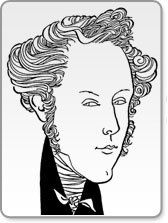by Steve Cohen
 Golden
Age is billed as the third in a trilogy of plays by Terrence McNally
with opera as its subject. This new piece is about to be presented at
the Kennedy Center along with McNally's 1989 comedy, The Lisbon Traviata,
and his 1995 drama, Master Class. Golden Age's world premiere
was January 27 at the Philadelphia Theatre Company.
Golden
Age is billed as the third in a trilogy of plays by Terrence McNally
with opera as its subject. This new piece is about to be presented at
the Kennedy Center along with McNally's 1989 comedy, The Lisbon Traviata,
and his 1995 drama, Master Class. Golden Age's world premiere
was January 27 at the Philadelphia Theatre Company.
It is instructive to note that McNally actually wrote a fourth play about opera, Prelude and Liebestod. What the three in this so-called trilogy really have in common is not just opera, but Maria Callas, the obsession of McNally's life.
The Lisbon Traviata is about a fan's search for a tape of an especially significant Callas performance, while Master Class is about the woman herself. Golden Age, on the other hand, takes place a century before Callas's life, so you may wonder how McNally could involve her in it.
Here's how. The new play gives a prominent part to the singer Maria Malibran, who was a precursor of the Callas persona. Both were known for stormy personality and dramatic intensity and for their libertarian approach to sex and marriage. But McNally has invested the first Maria with even more Callas characteristics than she actually had. The playwright may not have planned this, but his passion and his instincts took him in that direction.
His Malibran talks, as Callas later did, about how she has lost her voice and has come to Paris to die, which Callas did at age 53. But Malibran was only 28 when she died, and it was not in Paris but in London after a horseback riding accident. It isn't that McNally is cheating, or trying to put something over on us. I believe that the playwright is expressing his passion for Callas's approach to opera and this resonates with those of us who share some of his enthusiasm about Callas's singing and acting.
This play chronicles the premiere of Bellini's final opera, I Puritani. Malibran wasn't even in the cast of Puritani. (In fact, she never appeared in any Bellini premiere.) Historically, she did not attend the opening night but McNally imagined what might have transpired if she did sneak in, and in this play she gradually proceeds to take center stage. She speaks of how the text always comes ahead of the music, and how she delves to find the truth inside whatever she performs. She even recites the text of Puritani's big aria, much as Callas did in McNally's Master Class.
McNally's concentration on Malibran diverts us from the composer, Bellini, who logically should be the center of attention. He was prodigiously gifted, died young, and we know little about his personal life. So here was a golden opportunity for McNally to explore.
What we do see of Bellini is insecure and shallow, and Austin Pendleton makes things worse by directing Jeffrey Carlson as a fey poseur. Bellini laments that "people love me for what I write, not for who I am." But what we see of him is not lovable. We soon lose interest in this caricature and our attention and the playwright's turn to the carryings-on of the four star singers in Puritani's premiere.
The play's biggest flaw is that its focus is unclear. I advise McNally to go with his instincts and center the play on his obvious passion. Go, Terrence, and explore the enduring appeal of Callas's art. Show us how she makes you "see the music inside the music" and explain how you "hear the passion of life" when she sings. To do this, trim the other parts of the story.
Golden Age is divided into three acts as it mirrors the performance of the opera. That's logical, but each act needs to fly faster, and perhaps the second and third acts can be performed without an intermission between them. The music we hear off-stage, by the way, is a recording made by Callas.
The best work onstage is by Marc Kudisch as an egocentric baritone and Christopher Michael McFarland as an unusually aware and confident tenor. The number of topics they discuss is prodigious. Music lovers will relish hearing about vocal techniques, public tastes and gossip about other singers and composers.
Cheap laughs are gained by having the baritone stuff a cucumber in his trousers to appear sexually endowed, as he says he's adding "characterization." This shtick is needlessly repeated and it lowers the tone of the play, as does a fuss that the singers make about ordering and eating a pizza. The romantic obsessions of the male singers are another unnecessary distraction, and two proposal scenes could be excised.
Another one of my favorite playwrights, Donald Margulies, just said about his latest piece: "The difference between L.A. and New York is really pruning it - it was overwritten, I was trying things out, which is what a world premiere is for." That's what McNally and director Pendleton must do.
I hope some interesting little things are not cut, like the delicious inside joke of Bellini playing "People Will Say We're in Love" as an aria-in-progress from his next opera and a listener commenting that Bellini has never written anything like that. (Richard Rodgers wrote the song in 1943.)